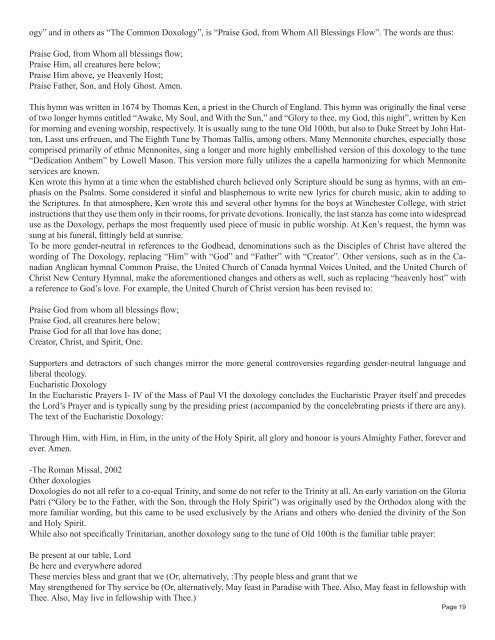Doxologies in the New Testament
Doxologies in the New Testament
Doxologies in the New Testament
Create successful ePaper yourself
Turn your PDF publications into a flip-book with our unique Google optimized e-Paper software.
ogy” and <strong>in</strong> o<strong>the</strong>rs as “The Common Doxology”, is “Praise God, from Whom All Bless<strong>in</strong>gs Flow”. The words are thus:<br />
Praise God, from Whom all bless<strong>in</strong>gs flow;<br />
Praise Him, all creatures here below;<br />
Praise Him above, ye Heavenly Host;<br />
Praise Fa<strong>the</strong>r, Son, and Holy Ghost. Amen.<br />
This hymn was written <strong>in</strong> 1674 by Thomas Ken, a priest <strong>in</strong> <strong>the</strong> Church of England. This hymn was orig<strong>in</strong>ally <strong>the</strong> f<strong>in</strong>al verse<br />
of two longer hymns entitled “Awake, My Soul, and With <strong>the</strong> Sun,” and “Glory to <strong>the</strong>e, my God, this night”, written by Ken<br />
for morn<strong>in</strong>g and even<strong>in</strong>g worship, respectively. It is usually sung to <strong>the</strong> tune Old 100th, but also to Duke Street by John Hatton,<br />
Lasst uns erfreuen, and The Eighth Tune by Thomas Tallis, among o<strong>the</strong>rs. Many Mennonite churches, especially those<br />
comprised primarily of ethnic Mennonites, s<strong>in</strong>g a longer and more highly embellished version of this doxology to <strong>the</strong> tune<br />
“Dedication An<strong>the</strong>m” by Lowell Mason. This version more fully utilizes <strong>the</strong> a capella harmoniz<strong>in</strong>g for which Mennonite<br />
services are known.<br />
Ken wrote this hymn at a time when <strong>the</strong> es tab lished church be lieved on ly Script ure should be sung as hymns, with an empha<br />
sis on <strong>the</strong> Psalms. Some con sid ered it s<strong>in</strong> ful and blas phe mous to write new lyr ics for church mu sic, ak<strong>in</strong> to ad d<strong>in</strong>g to<br />
<strong>the</strong> Script ures. In that at mo sphere, Ken wrote this and sev er al o<strong>the</strong>r hymns for <strong>the</strong> boys at W<strong>in</strong> chest er Col lege, with strict<br />
<strong>in</strong> struct ions that <strong>the</strong>y use <strong>the</strong>m on ly <strong>in</strong> <strong>the</strong>ir rooms, for pri vate de vo tions. Iron ic al ly, <strong>the</strong> last stan za has come <strong>in</strong>to wide spread<br />
use as <strong>the</strong> Dox ol o gy, per haps <strong>the</strong> most fr equent ly used piece of mu sic <strong>in</strong> pub lic wor ship. At Ken’s request, <strong>the</strong> hymn was<br />
sung at his fun er al, fit t<strong>in</strong>gly held at sun rise.<br />
To be more gender-neutral <strong>in</strong> references to <strong>the</strong> Godhead, denom<strong>in</strong>ations such as <strong>the</strong> Disciples of Christ have altered <strong>the</strong><br />
word<strong>in</strong>g of The Doxology, replac<strong>in</strong>g “Him” with “God” and “Fa<strong>the</strong>r” with “Creator”. O<strong>the</strong>r versions, such as <strong>in</strong> <strong>the</strong> Canadian<br />
Anglican hymnal Common Praise, <strong>the</strong> United Church of Canada hymnal Voices United, and <strong>the</strong> United Church of<br />
Christ <strong>New</strong> Century Hymnal, make <strong>the</strong> aforementioned changes and o<strong>the</strong>rs as well, such as replac<strong>in</strong>g “heavenly host” with<br />
a reference to God’s love. For example, <strong>the</strong> United Church of Christ version has been revised to:<br />
Praise God from whom all bless<strong>in</strong>gs flow;<br />
Praise God, all creatures here below;<br />
Praise God for all that love has done;<br />
Creator, Christ, and Spirit, One.<br />
Supporters and detractors of such changes mirror <strong>the</strong> more general controversies regard<strong>in</strong>g gender-neutral language and<br />
liberal <strong>the</strong>ology.<br />
Eucharistic Doxology<br />
In <strong>the</strong> Eucharistic Prayers I- IV of <strong>the</strong> Mass of Paul VI <strong>the</strong> doxology concludes <strong>the</strong> Eucharistic Prayer itself and precedes<br />
<strong>the</strong> Lord’s Prayer and is typically sung by <strong>the</strong> presid<strong>in</strong>g priest (accompanied by <strong>the</strong> concelebrat<strong>in</strong>g priests if <strong>the</strong>re are any).<br />
The text of <strong>the</strong> Eucharistic Doxology:<br />
Through Him, with Him, <strong>in</strong> Him, <strong>in</strong> <strong>the</strong> unity of <strong>the</strong> Holy Spirit, all glory and honour is yours Almighty Fa<strong>the</strong>r, forever and<br />
ever. Amen.<br />
-The Roman Missal, 2002<br />
O<strong>the</strong>r doxologies<br />
<strong>Doxologies</strong> do not all refer to a co-equal Tr<strong>in</strong>ity, and some do not refer to <strong>the</strong> Tr<strong>in</strong>ity at all. An early variation on <strong>the</strong> Gloria<br />
Patri (“Glory be to <strong>the</strong> Fa<strong>the</strong>r, with <strong>the</strong> Son, through <strong>the</strong> Holy Spirit”) was orig<strong>in</strong>ally used by <strong>the</strong> Orthodox along with <strong>the</strong><br />
more familiar word<strong>in</strong>g, but this came to be used exclusively by <strong>the</strong> Arians and o<strong>the</strong>rs who denied <strong>the</strong> div<strong>in</strong>ity of <strong>the</strong> Son<br />
and Holy Spirit.<br />
While also not specifically Tr<strong>in</strong>itarian, ano<strong>the</strong>r doxology sung to <strong>the</strong> tune of Old 100th is <strong>the</strong> familiar table prayer:<br />
Be present at our table, Lord<br />
Be here and everywhere adored<br />
These mercies bless and grant that we (Or, alternatively, :Thy people bless and grant that we<br />
May streng<strong>the</strong>ned for Thy service be (Or, alternatively, May feast <strong>in</strong> Paradise with Thee. Also, May feast <strong>in</strong> fellowship with<br />
Thee. Also, May live <strong>in</strong> fellowship with Thee.)<br />
Page 19

















